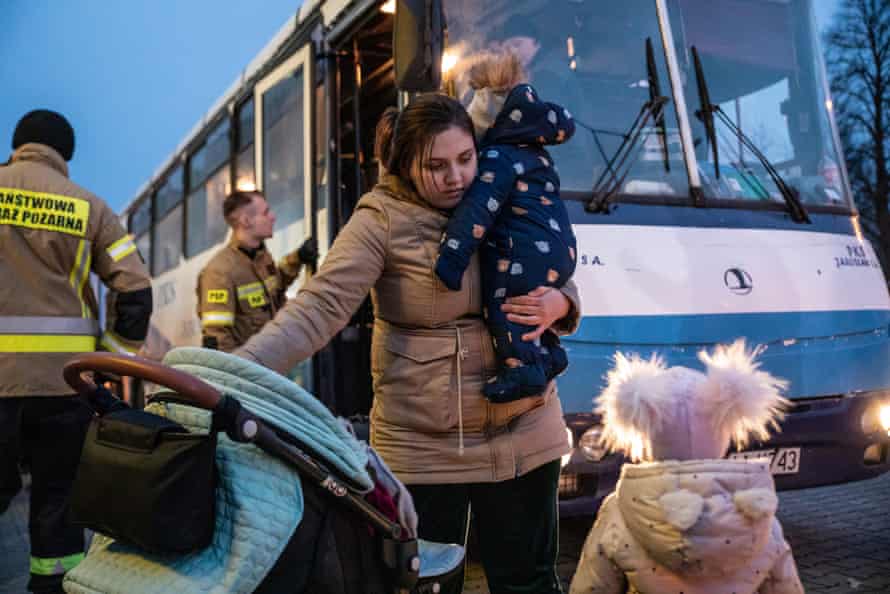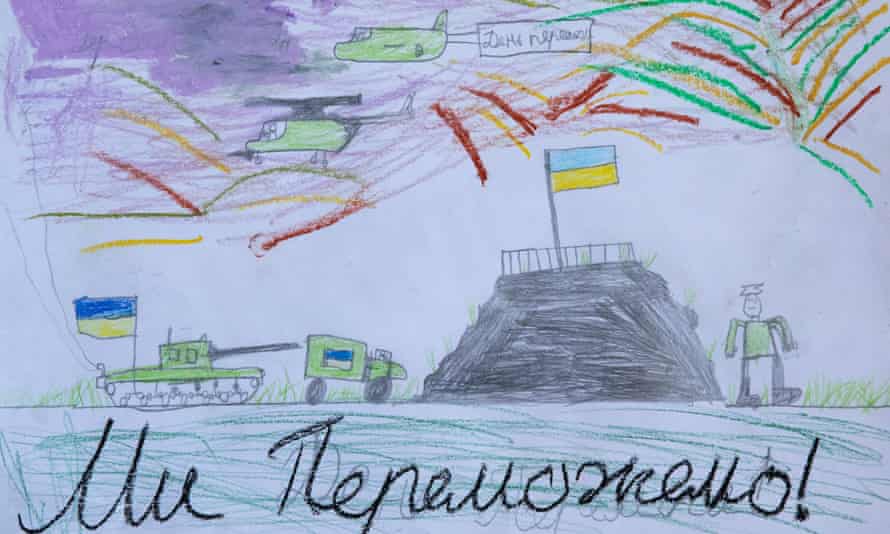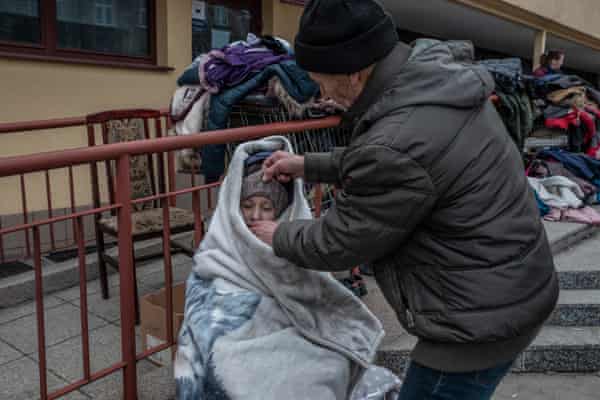Two days after Russian forces entered Ukraine, on 26 February, the country’s public military administration requested that a psychological support system be put in place at Lviv train station.
Thousands of women and children were passing through the station, 80km (50 miles) from the border with Poland, and the need for doctors and psychiatrists to support the displaced was immediately clear.
“The first week was very difficult,” says Dr Orest Suvalo, psychiatrist and coordinator of the support centre. “There were people arriving from Kyiv and Kharkiv who showed critical signs of distress. Many children, but also adults, were panicking, looking for shelters and buses to Poland.’’
Mental health workers and doctors in Lviv report that thousands of Ukrainian refugee children displaced by the war are showing severe symptoms of trauma. “I have seen children here with catatonic symptoms, where they kind of freeze and don’t react to any outside stimulation,” says Dr Viktor Balandin, psychologist for the Ukrainian NGO Osonnya. “Many of them have stopped speaking, others cannot move their hands or fingers. They just freeze.”
Since the Russian invasion began, millions of Ukrainian children have had to abandon their schools, toys and games. They have been forced to leave their bedrooms to move into bomb shelters, basements and refugee facilities. The war has also killed their peers; according to Ukraine’s general prosecutor, 90 children have died so far.
The trauma of the conflict runs deep for young people who are displaced, with many, if not most of them, bearing the psychological scars of terror.
Mental health doctors in Ukraine say the sudden absence of fathers, forced to remain in the country after the government applied martial law banning men aged 18-60 from leaving, has also had a significant impact on children’s lives.

“For younger children, up to two or three years old, their mental health conditions depend on the condition of their parents, usually the mother,” says Balandin. “If the mother is in an emotionally stable condition, their children will also be more stable. While, for teenagers, things are different, because they already understand what’s going on. At their age, teenagers are naturally processing, adapting and accepting their own egos. But too much change in their life means more difficulties to adapt to and accept.”
Beyond the train station, those who work in the arts have responded to the need for therapeutic support. Bohdan Tykholoz, director of the Franko Museum in Lviv, welcomes about 1,000 children every day to the theatre he runs with a team of child psychologists, artists, musicians and teachers. Children are engaged in art and music activities in order to offer them a bit of normality and a space to play.
“The idea was born when my two children and my wife had to leave the country and move to Germany, immediately after the conflict began,” says Tykholoz, who has named the project Fun for Courage. “My wife made a list of things she needed. The first was a hairdryer. The second: papers, markers and coloured pencils – anything they could use to create things they needed the most. When I realised the most urgent need for my children was to create, to draw, I immediately thought of this project. I told myself, ‘if I can’t help my children, because they are far away, I can help other children.’’’

Kateryna Sukhorebska, who is running art activities for displaced children in her bookshop in Lviv, says children are painting the reality of war: “They draw bombs and tanks, because that’s what they see with their own eyes. But there is also hope in their drawings, and the wish for peace and victory.”
The treatment of some of these mental health disorders requires immediate and constant therapy, but many Ukrainian children are constantly on the move. They are travelling long distances, on foot, by train, car and bus. Their families are forced to change dormitories, day after day. They are forced to stand in queues of people and vehicles stretching for miles before crossing the borders into Poland or Romania, waiting in the cold for up to 40 hours.
Suvalo explains that often his team do not have time to diagnose mental health disorders before the children have left the clinic, bound for another village or for Poland.

“I suppose that in western countries they will receive a lot of proper care,” he says. “If these children can live in a stable environment, they may also be able to convert these traumas into resilience, as is the history of our Ukrainian people.
“If you look at the history of Ukraine, in the 20th and 21st centuries, it is full of great traumas. The first world war, the second world war, the Soviet occupation, and the internal revolutions of the last ten years, up until this terrible invasion. Yet, despite these wars, despite the destruction, despite the bombs and tragedies, despite everything, we are still alive.”
In the UK, Samaritans can be contacted on 116 123 or email jo@samaritans.org. You can contact the mental health charity Mind by calling 0300 123 3393 or visiting mind.org.uk
Sign up for a different view with our Global Dispatch newsletter – a roundup of our top stories from around the world, recommended reads, and thoughts from our team on key development and human rights issues, delivered to your inbox every two weeks:
Sign up for Global Dispatch – please check your spam folder for the confirmation email

